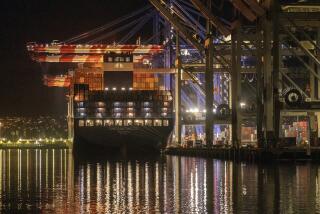Seaside Resort Falls Victim to Rapid Argentine Inflation
- Share via
MAR DEL PLATA, Argentina — Even at the worst of times, a summer stay at the seashore was always a sacrosanct tradition for sun-worshiping Argentines.
This year, however, an unprecedented post-Christmas bashing of buying power--many prices shot up 200% in a few days of hyper-inflationary convulsions--has made for some grim days at the beach for those who can still afford to visit at all.
Mar del Plata is a middle-class resort city of crowded boardwalks, pinball arcades and high-rise apartments, flanked up and down the Atlantic coast by more luxurious seaside villages. From December to early March, the population of 600,000 swells by up to 1 million visitors escaping the sweltering Southern Hemisphere summer in Buenos Aires, 250 miles to the northwest, and many inland cities.
Thanks in part to the late President Juan D. Peron, the working class too enjoys the Mar del Plata season. Trade unions, the backbone of the Peronist movement now led by President Carlos Saul Menem, built huge hotels in the city and offer cheap, subsidized holidays for members.
A year of hyper-inflation and economic turmoil, however, and the devastating burst of renewed price increases over the New Year’s weekend mauled many families. Some canceled their trips altogether. The number of arriving tourists was down by roughly 20% in the first two weeks of the year. And those who did come are misers, say local business people.
“Business is down by 70%,” said stationery store owner Daniel Suby, one of the many Mar del Plata merchants who count on summer sales to see him through the year. “We need one solid, stable year. The people have lost a lot of confidence in banks and the government. And the impact is even worse because of the optimism we had after Menem took office.
“I am 58, I have lived through many phases of Peronism,” he said. “They always started well, and finished badly.”
Vicente Chumilla, of the city tourism office, recalled that “last year, people waited desperately here at our door, asking for any place at all to sleep.” Now, hotel rooms are available and discounts are offered. The elegant Hotel Provincial on the beachfront, the city’s best with sea-facing doubles costing up to $140, was half full, a sign that even the well-off are not immune to the crisis.
Theaters have cut prices by 40% from the New Year’s high to attract patrons. Restaurants that normally have long lines for tables are also struggling.
Albert Hovhannessian, an Armenian immigrant who runs the popular, inexpensive Raviolandia Restaurant, was distraught.
“People still come, but they share dishes, spending less than $1 per person,” he said. Taking out a stack of more than 200 credit card slips that he has not yet submitted, he noted, “When I sold these meals, cooking oil cost 23,000 australs per container. Now it costs 80,000. And my customers’ prices are unchanged. Plus, the credit card companies discount 10% of the charge for inflation.
“I am shrinking more each day,” Hovhannessian said. “I am waiting for the end. For the first time, I am not paying salaries on time. But the staff is loyal. They understand, for now.”
Luis Domanico, a 30-year-old member of the Light and Power Workers Union, was still able to bring his wife, Liliana, and two children to the beach because he had paid in installments all year, and the rate is just $5 a person per day, meals included. But instead of staying two weeks, the family was staying 10 days.
“People drink mineral water this year, not clerico (a wine punch),” Domanico said. “Before, we went to shows, we bought alfajores (a filled cookie). But my buying power has been reduced so much. We used to go to video game parlors for the children; now we stroll and window shop.”
He voted for Menem “because he gave off an image that the old Peronism had to change, that we couldn’t be against the whole world. We had to realize, for example, that we couldn’t be against the invasion of Panama because we are a poor debtor; we owe everybody. It hurts sometimes, but it’s more realistic.”
Domanico still supports the Peronist president, despite the criticism of many union leaders that the new conservative free-market policies are punishing the workers. “There seems to be no other way; there are no resources, no options,” Domanico said.
“This is a very difficult transition, we have to knock down many old myths. This is not a process of months, but years. There are very few groups against this, a consensus has emerged.”
An inspector of airport lighting, Domanico has seen his monthly salary bounce in dollar terms from as much as $800 in past years to as little as $75 last July, back to $300 or so in recent months until the latest hyper-crisis. The family no longer can afford a car.
“We always say, this time we’ll get through it. But my mind is racing now. I look at my children and ask, what future do they have? These children never hear optimistic conversations.”
More to Read
Sign up for The Wild
We’ll help you find the best places to hike, bike and run, as well as the perfect silent spots for meditation and yoga.
You may occasionally receive promotional content from the Los Angeles Times.






